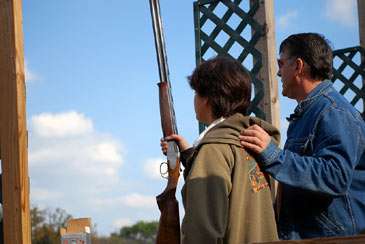Your Kids and Gun Safety

In this article, you will find:
The debate over gun control
Your Kids and Gun Safety
Tragedy on the Firing Range
It was supposed to be a fun day out, a chance for father and son to bond. Dr. Charles Bizilj and his eight-year-old son, Christopher, visited a shooting range in western Massachusetts to test-fire automatic weapons under the supervision of trained instructors. But as Christopher fired an Uzi at stationary targets, the recoil was too strong for him to handle. The barrel of the gun swung upward, and before anybody could react, Christopher had fatally shot himself in the head. His father, standing only feet away, was helpless to do anything but watch.
Was it a freak accident? Or could Christopher's death have been prevented?
The Great Debate
There's no getting around it: Gun ownership and firearm safety is a divisive issue that inflames passions on both sides, particularly where children are involved. Gun owners point to statistics showing that it's more dangerous to own an in-ground swimming pool than a firearm. Gun control advocates argue that even one accidental gun death is too many, especially because they can be so easily prevented. The debate has played out in countless venues across the country: in elections, community meetings, and in legal battles that have reached all the way to the Supreme Court.
At the center of every argument is the intent of the Second Amendment of the Bill of Rights, which reads, "A well regulated Militia, being necessary to the security of a free State, the right of the people to keep and bear Arms, shall not be infringed." To many Second Amendment loyalists, the meaning is clear: Individuals have the constitutional right to own guns. Even as weapon technology advances, and personal firearms become more lethal, they argue that this plain meaning has not changed. Furthermore, they claim, the Framers of the Constitution plainly intended personal gun ownership to be a check on government tyranny.
Critics of that interpretation point to the clause about a "well regulated Militia," which could mean that government regulation of firearms is welcome and necessary, and that gun ownership isn't intended to be unfettered for individuals. Critics also point out that the Bill of Rights was drafted in an era when the most powerful weapon a person could wield was a ball-and-powder musket, or a breech-loading rifle. Today's high-powered automatic weapons, they argue, are beyond the ken of the Framers and should be regulated as such.
The Supreme Court took the former view in hearing a case about a handgun ban in Washington, D.C., its first gun-rights case in 70 years. Although crime rates have been dropping steadily in Washington, D.C. for some time, the city still suffers from one of the worst crime rates in the nation - ranked 18th nationwide in 2006, according to F.B.I. statistics. The plaintiffs in the court case argued that keeping guns out of the hands of law-abiding citizens robbed them of a necessary right to self-defense. Defendants pointed to the declining crime rate, and claimed that allowing more guns into the city could only reverse the progress. With a 5-4 majority, the Justices decided that the handgun ban was unconstitutional.